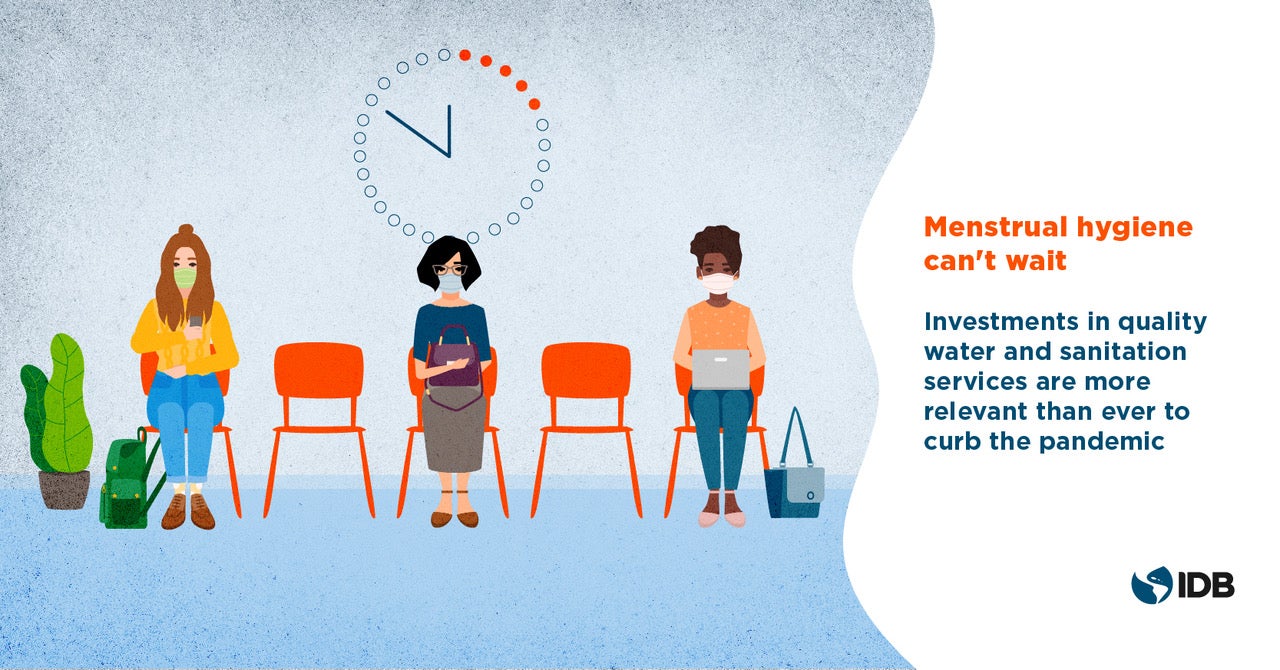On International Menstrual Hygiene Day, it is important to redouble the sense of urgency to provide better water, sanitation, hygiene, and solid waste services in order to guarantee equal opportunities to girls, adolescents, and women in Latin America and the Caribbean.
By Anamaria Nuñez and Julio Marenco
Sol has never missed a single day of class so far this school year. Luna is frequently absent. It’s not that Sol is more dedicated than Luna. It’s just that, despite living in the same country and the same city, the two live two distinct realities, as different as day and night.
The bathrooms at Sol’s school are always working, they’re clean, and have a door that allows privacy, a receptacle for disposing of waste, and water and soap for washing hands before rejoining her activities. As such, when Sol has her period, she can deal with it without experiencing any difficulties.
For Luna, the arrival of her period means she often misses classes because the bathrooms in her school aren’t functioning much of the time, they smell bad, and they typically lack the most basic hygiene items, like soap and water.
Sol and Luna aren’t real people, but their stories are the stories of millions of girls, women, and adolescents in Latin America and the Caribbean. Like Luna, more than 450 million people lack access to reliable sanitation services. For women, not only at school, but also at home or in the workplace, proper menstrual hygiene management (MHM) refers to the ability to have hygiene products to absorb or collect menstrual flow, privacy for changing such products, and access to a means of disposing of these after their use.
This May 28, we commemorate International Menstrual Hygiene Day. One of the main calls to action of the day is to not slow down with respect to the investments that are necessary for infrastructure, education, and health, to ensure that all women can manage their menstrual hygiene properly, thereby ensuring their full inclusion in all aspects of their development, from school attendance to daily work, whether in the workplace or in leisure spaces.
IDB’s Vision 2025, which guides work to improve lives in Latin America and the Caribbean, has gender equality and inclusion as one of its pillars, promoting women’s work participation, eradicating sexual- or gender-based violence, and fostering female inclusion and empowerment. Post-pandemic economic recovery in Latin America and the Caribbean is key to ensuring inclusion and equity, especially in traditionally vulnerable groups, such as women.
With this in mind, the IDB has, since its beginning, invested in projects that provide access to water, sanitation, hygiene, and solid waste services, and that promote human development, emphasizing women’s empowerment in beneficiary communities at every stage: from consultancies, to the design of interventions to ensure that these meet the specific needs of each community, to the maintenance of the infrastructure.
This approach, informed by the gender perspective, confers multiple benefits, such as the inclusion of women in the labor market, in governance, and in the management of services, which leads to improvements in the sustainability of investments, since communities take ownership of projects and become actively involved in their maintenance.
Thus, it is important to redouble the sense of urgency to provide more and better access to water, sanitation, hygiene, and solid waste services, so that in Latin America and the Caribbean, stories like Sol’s can shine and multiply, with the possibility of having menstrual hygiene that ensures their full development. The menstrual hygiene of millions of Latin American and Caribbean girls, adolescents, and women can’t – and shouldn’t – wait.
*Julio Marenco is a strategic communications consultant in the IDB’s Water and Sanitation Division. He holds a Master of Multimedia Arts from the University of California and a Bachelors of Communication and Journalism from the Central American University of El Salvador.


Leave a Reply